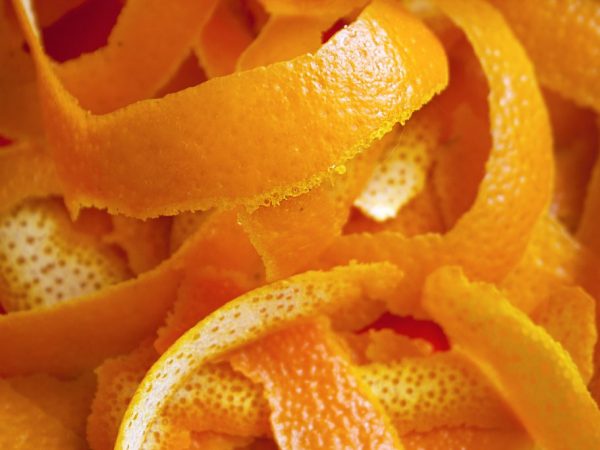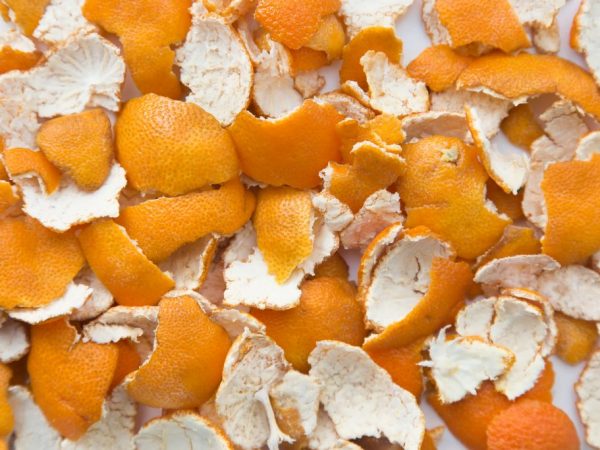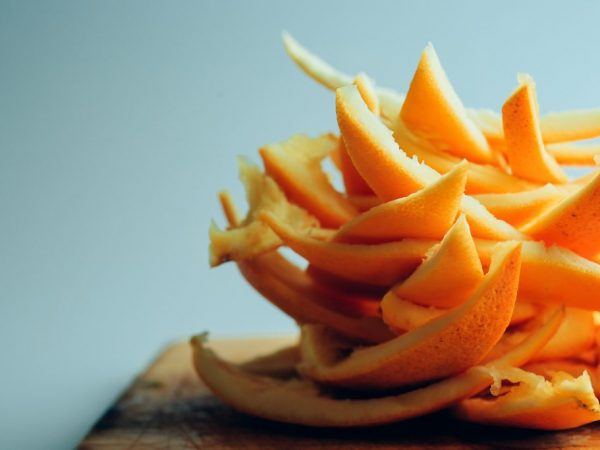How to apply orange peels in the garden
Oranges are a source of vitamins, minerals and other beneficial substances for the human body. In this fruit, not only the juicy pulp, but also the rind brings potential benefits. The use of orange peels is used in various fields.

Applying orange peels in the garden
Areas of use
Do not throw the citrus peel into the bucket after the juicy pulp has been eaten: it will still be beneficial. Orange peel has found applications:
- in agriculture;
- in gardening;
- in beekeeping;
- in cosmetology;
- at home.
Agricultural applications
In agriculture and horticulture, orange and tangerine peels are used for composting, nitrogen fertilization and pest control.
Fertilizer use
Organic food waste is great for compost. Rotten orange peels are easily absorbed by plants. All aromatic substances from them are converted into safe chemical compounds that feed on the soil and microorganisms in it.
To speed up the decay of the peel in the compost pit, the orange peels are crushed. Citrus blue mold does not develop in compost due to the high decomposition temperature of organic waste. Mold spores have no chance of surviving and multiplying.
The crushed peel is dropped into the soil up to 5-6 cm. After a while, orange peels release nitrogen, sulfur, magnesium, calcium and other nutrients into the soil. The organic pesticides of these fruits are volatile and do not harm the microorganisms in the soil.
Pest Control Use

Orange peels will get rid of the invasion of insects
Another use of orange peels in horticulture and agriculture is to control aphids and ants.
- The limonene content in orange peels can help fight ants or aphid infestations. It destroys the protective wax coating on their bodies, as a result the insect dies, suffocating. The specific citrus aroma serves as a deterrent against scale insects and other garden pests. Wireworms living in vegetable beds will die if ground peel powder is added to the soil.
- To protect against aphids, orange peels are cut into pieces and placed near the plants. From the invasion of ants, the oranges are carefully peeled off and cleaned of white fibers. After that, in a blender, the rest of the fruit is crushed with 50 ml of water. If the fruit is large and there is a lot of skin, the amount of water is proportionally increased. Ant minks are watered with this solution. All ant-infested areas are treated with a natural insecticide several times.
- In beekeeping, citrus broth is used. This is a bait for wild bees.It is used if an unwanted swarm has appeared on the site of a flowering garden, and you need to get rid of it. A branch is sprayed with broth, the swarm that has flown onto it is shaken off into a bag or at a prepared container, quickly closed and then destroyed.
If there are no vegetables on the plot of the garden or garden and you want more colors so that beautiful and harmless butterflies appear, it is worth scattering orange zest on the plot.
Application at the summer cottage
Orange, tangerine peels are used for:
- repelling mosquitoes;
- control of fleas and ticks in animals;
- fertilization of indoor plants.
Insect control
Limonene in oranges is effective against fleas, ticks and mosquitoes. A decoction against pests is prepared according to this recipe:
- the crusts are cut into pieces;
- boil in water for 30 minutes;
- cool and insist for 3 hours;
- filter through cheesecloth.
This solution is poured into a spray bottle and sprayed on the animals. Fleas in cats and dogs will disappear, and for mosquitoes and ticks, the citrus scent will become intolerable. To scare away mosquitoes from a person, a few drops of the broth are applied to clothing.
Several pieces of zest placed on the shelves in the cupboards will save you from the appearance of moths. This will leave your clothes undamaged and have a pleasant scent.
Fertilizer for indoor plants

The infusion from the peel can be used to fertilize plants
Orange peel is used as an organic fertilizer. The zest is chopped by hand or in a blender and poured with boiling water in a ratio of 1 part zest to 2 parts water. Insist 24 hours in a dark place, filter. Dilute with water in a 1: 1 ratio. Houseplants are watered with this solution weekly, depending on the level of humidity in the apartment.
Re-brewed skins are not used.
Food use
For food use, orange peels are thoroughly washed under running water. Then they are used to prepare seasonings, sauces or drinks.
To prepare a refreshing drink in the summer heat, a chopped orange peel is thrown into a jug, bones are removed from the pulp, a little honey or sugar, mint is added and cooled. On a hot day, this drink helps to restore energy.
The peel is carefully removed from the orange, cut it, fragrant jam or preserves are prepared, which in winter will remind you of the bright colors of summer and make up for the lack of vitamins in the body.
To preserve a pleasant aroma, the crusts need to be dried and folded into a prepared box. It is better to dry in the country, in a shaded place. Under the bright, scorching sun, the beneficial essential oils will evaporate.
Use in cosmetology
An aromatherapy procedure is impossible without fragrant citrus. At home, several orange peels are laid out in the rooms, a pleasant smell fills the house in a few minutes.
From the ground crust, folded in a linen bag, you get a sachet that works like a sleeping pill if you put it near the bed. Homemade scrub made from orange juice and orange peel, mixed with sugar, moisturizes and cleanses the skin, leaving it matte and silky.
As a mouthwash, a citrus infusion or decoction is indispensable. They give fresh breath and prevent periodontal disease.
Lovers of homemade natural soaps should use the peel in this case. Essential oils are used against dry and sagging skin.
Household use
Cutting boards shine clean and smell when rubbed with orange peel. The kitchen sink shines after being treated with this fruit. To achieve this effect, the crusts are completely cleaned of pulp, the work surface is cleaned with the outside.
Cats don't like fresh scent. If you put the skin in flower pots or flower beds, the animal will never want to dig in the ground, and the flower will remain unharmed.
The healing infusion acts as an antipyretic and treats sore throat.
Harmful use warning
It is not safe to use moldy orange peels for health. A fungus develops inside it, which leads to diseases of the lungs and gastrointestinal tract.
The zest can cause an allergic reaction. If this happens, you should immediately consult a doctor.
In case of overdose, aroma oils lead to dermatitis. They start using a small amount, after having carried out such a test: 1-2 drops of oil are applied to the wrist, rubbed in. If redness, swelling, or itching does not appear after 12 hours, citrus oils are safe to use.
Conclusion
Ordinary peels from exotic fruits will become real helpers in gardening and in everyday life, if you know the recipes and apply them correctly.


